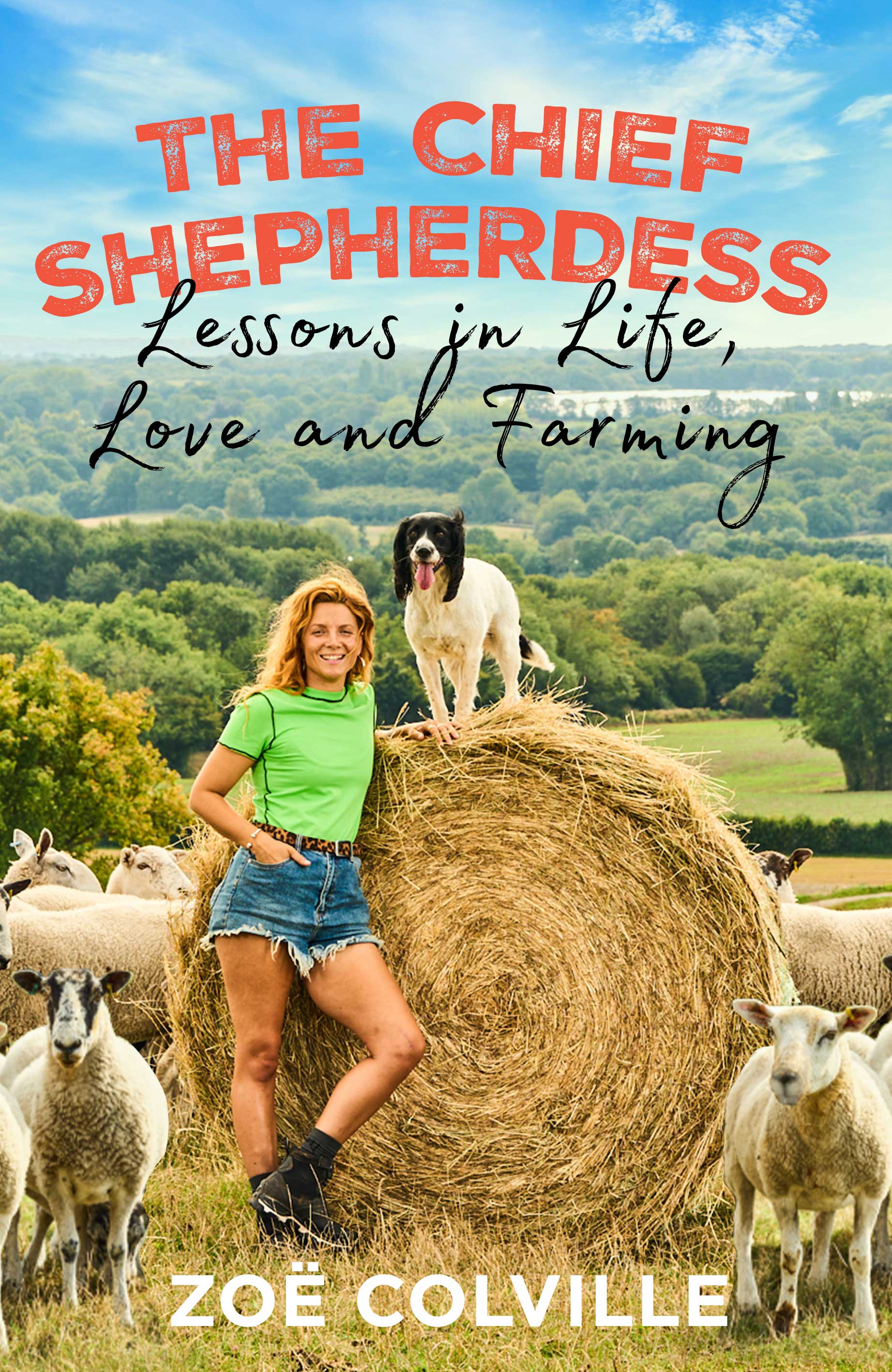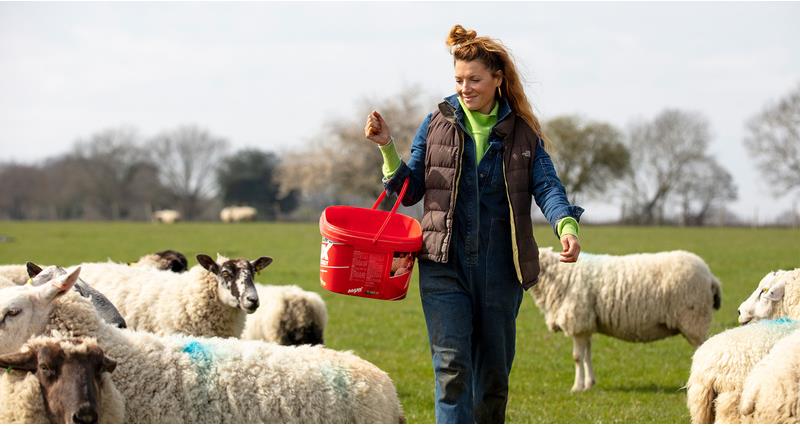First-generation farmer Zoë and her partner Chris rent land across Kent, farming sheep, cattle, and pygmy goats. The couple started with 32 pregnant ewes and now lamb some 500 breeding ewes over 100 acres near Maidstone.
ŌĆ£ItŌĆÖs not been very conventional, but weŌĆÖve managed to make it work,ŌĆØ Zo├½ told Student Farmer, ahead of the launch of her book, The Chief Shepherdess: Lessons in Life, Love and Farming.
Having never considered a career in farming, Zoë has since learned to butcher by watching videos on YouTube during one of the Covid lockdowns. The couple now sell their meat online via their shop, The Little Farm Fridge.
ŌĆ£We were staying in a caravan on the farm during lambing and we were brainstorming and it got to the point we were like, ŌĆśitŌĆÖs now or never, we need to strike while the iron is hotŌĆÖ,ŌĆØ she said. ŌĆ£So we took out a loan, went to our landlady and said ŌĆścan we put a unit inŌĆÖ, brought a second-hand mobile office and decked it all out with the hygiene boards and got all of our certifications.
ŌĆ£Chris and I arenŌĆÖt scared to have a go at things because, at the end of the day, what are you going to lose, money? I know money is very important, especially when you donŌĆÖt have it, but no-one is going to die. I think, because weŌĆÖre dealing with life and death all the time on the farm, youŌĆÖre actually not scared of failing because if no-oneŌĆÖs going to die when you fail itŌĆÖs not as bad as situations you have been in.ŌĆØ
Salon to shepherdess
ŌĆ£I feel passionately that young people now have every opportunity, and they should utilise it to make sure itŌĆÖs definitely what they want to do.ŌĆØ
Zoë Colville
After Chris brought the first ewes, Zoë began spending weekends and holidays in Kent with Chris, who spent some of his childhood on a farm but was working as a plumber when the pair met. But she said it was the passing of her father that made her embrace farming fully.
ŌĆ£Farming became real, it balanced me out,ŌĆØ she explained. ŌĆ£I felt really heavy after dad died. It was a sadness IŌĆÖd never had before but getting into a routine where you get up when the sun comes up and finish work when it goes dark, it really it sorted me out.ŌĆØ
While she acknowledges farming may appear like a strange choice for someone who is grieving ŌĆō threaded through as it is with death ŌĆō she said: ŌĆ£The thing with farming is death and sadness is always balanced out with new life and growth and beautiful sunrises, whereas in human life itŌĆÖs hard to find those things. They donŌĆÖt stare at you straight in the face.ŌĆØ
As to how her shepherdess life contrasts to the salon, the biggest difference is being unable to plan ahead.
ŌĆ£My old life was literally planned to within an inch of its life,ŌĆØ she said, adding her appointments would be booked in weeks in advance with her only stress being turning clients around on time.
The change was a lot to get used to at first. ŌĆ£It was quite a hard transition. I had three diaries and it used to drive Chris crazy because IŌĆÖd be like, ŌĆśwhat are we doing tomorrowŌĆÖ and heŌĆÖd be like, ŌĆśthis, this and this but it might change for this and thisŌĆÖ and I couldnŌĆÖt understand. It used to drive him mental.ŌĆØ
116455,116452,116453,116454
Rollercoaster moments
As with any new career, the transition has had its ups and downs.
Probably the most difficult to deal with is the lack of control over the weather. ŌĆ£ItŌĆÖs when things are completely out of your control and you have to try and claw back,ŌĆØ she said, using the 2020 drought as an example. ŌĆ£We had to sell about 300 of our breeding ewes during that because we just didnŌĆÖt have the grass and that cut really deep because it wasnŌĆÖt anything that weŌĆÖd done. ThatŌĆÖs probably the hardest thing, being under Mother NatureŌĆÖs thumb.ŌĆØ
Among the highs, she laughed, is surviving in a functional relationship with Chris. ŌĆ£ItŌĆÖs not a normal business weŌĆÖre running, itŌĆÖs high stress and intense 365 days a year. The fact we still go to bed and donŌĆÖt want to rip each otherŌĆÖs throats out, thatŌĆÖs a real high for me.ŌĆØ
ThereŌĆÖs also the growth from year to year: ŌĆ£The first year I lambed I wasnŌĆÖt comfortable skinning a lamb to adopt it on to another one, whereas the year after I found the confidence to do it.ŌĆØ
Be sure
For anyone new to or wanting to join the industry, Zoë said be sure before committing to it.
ŌĆ£There are so many opportunities now to try before you buy. WeŌĆÖre at a time where if you type in ŌĆśshepherdessŌĆÖ on Instagram there are 100 accounts you can contact,ŌĆØ she said.
ŌĆ£I feel passionately that young people now have every opportunity, and they should utilise it to make sure itŌĆÖs definitely what they want to do.ŌĆØ
She added weŌĆÖre at a ŌĆ£really exciting time for farmingŌĆØ, pointing to Farmer Will appearing on Love Island and the industry gathering momentum on social media.
ŌĆ£Growing up, the only thing I knew about farming was foot and mouth disease, bird flu and swine flu. But now if someoneŌĆÖs farming video is coming up in some 15-year-oldŌĆÖs feed full of Kylie Jenner and lip plumpers, thatŌĆÖs amazing.
ŌĆ£Nowadays, you donŌĆÖt have to have a dad that works on a dairy farm or a grandad thatŌĆÖs a pig farmer. You donŌĆÖt need to have those things now and itŌĆÖs really exciting.ŌĆØ
Another must is a sense of humour. ŌĆ£You will not survive without one,ŌĆØ Zo├½ said, adding it needs to be a bit of a dark one at times. ŌĆ£You have to be able to laugh at yourself. Not at the situation, because some of them are horrendous, but you have to be able to see the light in some really dark situations.ŌĆØ
ItŌĆÖs the toll farming can take on your mental health that makes Zo├½ reiterate the importance of being sure this is the industry for you before you commit.
She explained the darkness of long winters, bad weather, and financial stresses can be drowning, adding mental health is a ŌĆ£huge thingŌĆØ.
ŌĆ£I feel like IŌĆÖve lost loads of friends because I canŌĆÖt keep up the friendship because IŌĆÖm so tired, and that can be quite isolating. I think thatŌĆÖs why I enjoy and kept up the social media so much, because IŌĆÖve gone from being surrounded by girls 24/7 and having really deep, meaningful conversations and friendships to it literally being me and Chris all day every day.
ŌĆ£ThatŌĆÖs why you have to be so certain before you fully dive into a career in farming,ŌĆØ she said.
Farming for the future
With the titles of farmer, butcher, and now published author under her belt, Zoë hopes to buy or rent a farm in the future where she can offer open days to anyone interested in getting into farming and to primary schools.
ŌĆ£ThatŌĆÖs what I really want to do. I love kids and love working with kids and would love to be able to offer that.ŌĆØ
Also on the to-do list is to turn The Little Farm Fridge into a collective, offering milk, cream and cheese from local dairy farmers.
ŌĆ£Initially, we were worried people wouldnŌĆÖt want to buy meat from the field in front of their house but itŌĆÖs not the case at all. People want to be connected and know the story behind it and learn where it came from and IŌĆÖd love to open that up a bit more.ŌĆØ

'The Chief Sheperdess: Lessons in Life, Love and Farming' by Zoe Colville is out now in hardback and is available from all High Street and online book shops.




